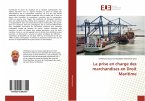Constituting the point of mutation of the contractual relationship from a "land" regime to a maritime regime, the taking over of the goods by the maritime carrier is both a material and a legal notion. The material notion is reflected in the implementation of a set of concrete procedures that the carrier will implement, with the support of the maritime transport auxiliaries, for a more refined verification of the cargo, in order to better cover its liability, in the face of possible future claims, of the beneficiaries of the cargo. A constraining exercise, it is difficult to reconcile with the sacrosanct imperative of the maritime economy that constitutes the "ship turnaround time" indicator. As a legal concept, it is the starting point for a specific regime, that of maritime law. In this case, it appears in the form of a real cursor covering, or uncovering, depending on the legal framework of reference - the Brussels Convention of 25 August 1924 or the French law of 18 June 1966- the "ante-palan" phase, refocusing or dispersing, depending on the case, the liability actions of those entitled to the goods.
Bitte wählen Sie Ihr Anliegen aus.
Rechnungen
Retourenschein anfordern
Bestellstatus
Storno








